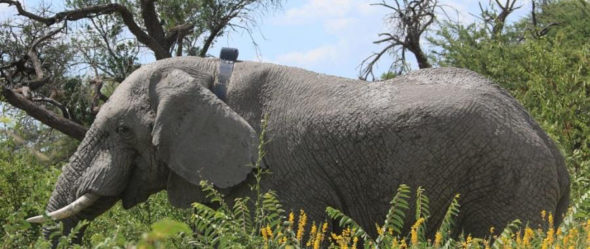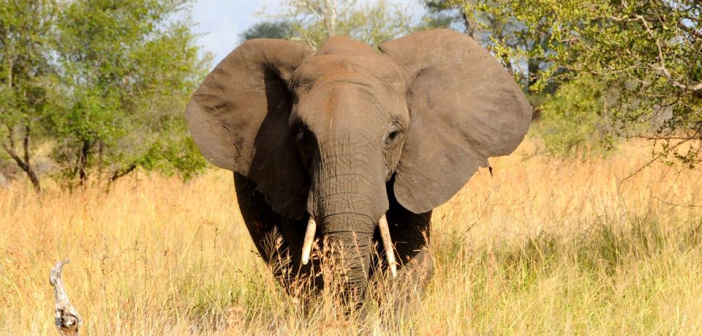Why are elephants in Northern Botswana migrating south into previously unoccupied habitat?
BY OSCAR NKALA - 2 MAY 2017 - NATIONAL GEOGRAPHIC A VOICE FOR ELEPHANTS
 Kwebe, the collared CKGR research bull.
Kwebe, the collared CKGR research bull.
Elephants from national parks in northern Botswana have started migrating south, deep into the semi-arid Central Kalahari Game Reserve (CKGR), which has no history as an elephant range, a leading elephant monitoring group notes.
In a report that gives insight into an ongoing aerial operation to track internal elephant movements, Kasane-based Elephants Without Borders (EWB) says that a decrease in migratory elephants’ movements across Botswana’s northern border from Zimbabwe, Zambia, and Namibia has coincided with more herds venturing farther south into the CKGR.
“In the past few years, EWB deployed monitoring collars on bulls sighted on the periphery of the southern CKGR range, which showed us that some elephants are now moving into the Central Kalahari seeking refuge, moving in and out of the national parks.
“This season, more elephants, including breeding herds have been sighted in previously unknown territory, coming into contact with cattle farms and villages around the CKGR, which were previously void of elephants,” the report says.
According to EWB, the migration trend to these new habitats could be caused by population pressure in the Chobe and Okavango areas, as more herds have opted for settling in Botswana than returning to their former ranges in countries to the north, where elephants know that poachers are a grave threat.
In Botswana human interference is minimal. That and access to more reliable water sources are encouraging more elephants to stay there and explore new habitats, including the CKGR.
The operation has tracked a few animals that were collared at the onset of the southward migration trend, which became noticeable about two years ago, and the evidence that elephants are moving deeper into the CKGR raises the risk of some conflict with humans.
“Two years ago we saw only collared bulls, but this year, to our amazement, we sighted elephant family herds, numbering up to 120 and divided into two large compact groups. Thus we managed to fit tracking collars on some females within each herd,” EWB reports.
Evidence of Poaching
The tracking operation has also revealed what seems to be evidence of poaching in the new southerly areas. Researcher Robert Sutcliffe says that from the air, a bull called Kwebe, who had been collared two years ago, looked healthy.
“It was only after the elephant had been darted, and we got closer, that we could tell he had sustained injuries,” Sutcliffe says. “Upon examination we discovered that he had two bullet wounds from shots that appeared to have been purposely aimed at his head.”
 Kwebe’s ‘brain shot’ wounds
Kwebe’s ‘brain shot’ wounds
The elephant survived only because the bullets were deflected by the tracking collar, resulting in minor injuries.
Besides the CKGR, the range of elephants in Botswana appears to be gradually expanding into the remote wilderness southwest of the Okavango Delta and toward the border with Namibia.
There has been no evidence yet of resident breeding herds there, but elephants are known to be moving into the desert along the Namibian border during the wet season and returning to Okavango Delta habitats at the peak of the dry season.
EWB has fitted some of the southwest Okavango migratory elephants with tracking collars as part of the ongoing aerial monitoring campaign.
Read original article:
http://voices.nationalgeographic.com/20 ... d-habitat/

 Kwebe, the collared CKGR research bull.
Kwebe, the collared CKGR research bull.